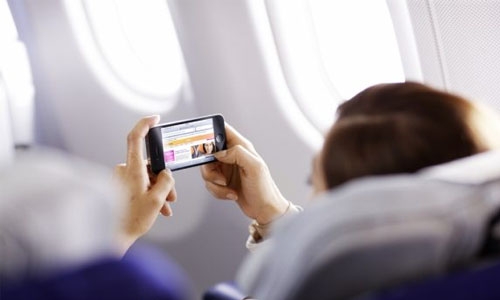What happens when you don't switch your phone to flight mode?
Airline passengers are repeatedly told to switch their mobile phones to flight mode – but what happens if they don’t?
There’s a belief that a phone’s signal can interfere with important electrical or telecommunications systems in the cockpit, but is it capable of causing a plane to crash?
MailOnline Travel reveals what happens when passengers or crew don’t switch off their phones during a flight.
Most commercial flights don’t allow passengers to use their mobile phones to make calls or send text messages in mid-air out of concerns over safety or the comfort of everyone on board.
The ban was originally brought in over fears the radio frequency emitted by mobiles belonging to passengers or crew could malfunction a plane’s electronic systems.
This is not a problem with new phones and on-board systems such as picocells, which aren’t widely used. But, on most flights, the ban remains in place.
Passengers are allowed to use their electronic devices, including smartphones and tablets, during the entire duration of a flight, including the pre-flight safety demonstration, as long as they have been switched to flight mode.
However, the rules may vary by airline.
Some international airlines have equipped some of their planes to allow voice calls and texts in-flight, said the UK Civil Aviation Authority.
In the US, the Federal Communications Commission has banned airborne calls using mobile phones since 1991 over concerns that they could disrupt towers on the ground.
The FCC has reconsidered the ban, but lawmakers have argued for it to remain in place solely for passenger comfort.
Those who travel by private jet, however, are usually permitted by the crew to use their devices to communicate with the outside world.
Some passengers believe personal electronic devices such as mobile phones and tablets need to be turned off because they could bring the plane down.
However, there is no evidence signals from passengers’ electronic devices have ever caused a plane to malfunction and crash, and experts said modern technology is safe and reliable.
It’s the same kind of noise that can be heard over speakers if a mobile is nearby and it’s due to the phone’s powerful radio emissions.
The system works using a small telecommunications base station called a picocell.
A picocell is low cost and typically the size of a ream of A4 paper.
It acts as a miniature mobile telephone tower communicating with mobile phones within the aircraft and relaying the signals to either satellites or a land-based system.
Communication between the picocell and the rest of the telephone network is on separate frequencies.
There is no interference with the aircraft's equipment as is the case with on–board phone systems already on many commercial aircraft.
Interference is reduced because both the picocell's and the phones' output power can be reduced to very low levels.
In a blog post for AirlineUpdates, a pilot wrote that transmitting mobiles can and do cause audible interference on an aircraft’s radios, but it’s fairly rare.
The pilot added: ‘You’ve probably heard this interference yourself when a phone is set near a speaker.
‘It sounds like a “dit-dit-dit-dit” tone and it’s pretty annoying.’
The pilot wrote that it doesn’t happen every time a phone is on inside a plane and they fly 50 times a month and only hear it through their headphones once or twice over that period.
The risk of interference has been drastically reduced by modern technology.
The pilot admitted interference is usually from a phone belonging to a crew member who forgot to switch it to flight mode, given that the pilots and forward flight attendants are seated closest to the radios.
If there is repeated interference from mobiles it could cause the flight crew to miss a critical radio call from air traffic control, the pilot wrote, adding that it happened on a recent flight as a passenger surreptitiously texted on his phone.
The interference stopped once the passenger was told to turn on flight mode.
While most flights ban voice calls and text messages in-flight, some international airlines have equipped some of their planes with telecommunications base stations, or picocells, which operate at very low power.
These specially-designed systems don't interfere with the flight crew's communications.
Related Posts

